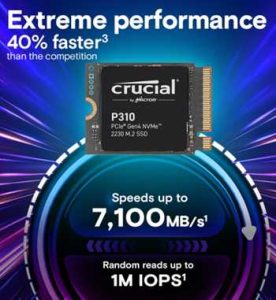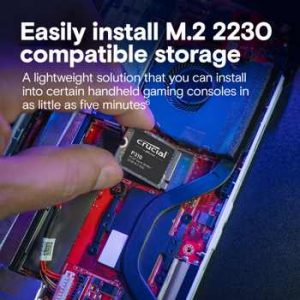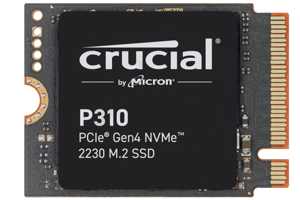Micron Unveils Crucial P310 2230 Gen4 Up to 2TB Consumer SSD to Accelerate Handheld Gaming, Ultrathin Laptops and Mini PCs
Up to 7,100 and 6,000MB/s RW speeds, and random reads up to 1 million IO/s
This is a Press Release edited by StorageNewsletter.com on July 22, 2024 at 2:01 pmMicron Technology, Inc. announced the availability of the Crucial P310 2230 Gen4 NVMe SSD, which empowers enthusiasts of handheld gaming and users of mini PCs and ultrathin laptops to store more games and data-intensive content at their fingertips without sacrificing speed or performance.
With RW speeds of 7,100 and 6,000MB/s, respectively,(1) and capacities up to 2TB, the P310 2230 SSD packs a unique punch, offering high performance and capacity in a compact, power-efficient form factor.
“Today’s contemporary games are storage- and performance-hungry, and this is especially true for handheld gamers who want to be able to quickly access all their favorite games at their fingertips,” said Jonathan Weech, senior director, product marketing, commercial products group. “We’ve built our Crucial P310 2230 Gen4 SSD to satisfy this need for speed and more capacity, providing a dynamic, power-efficient SSD that allows gamers to build their dream gaming libraries, load multiworld games faster and extend battery life for a richer gaming experience on the go.”
Crucial P310 2230 Gen4 SSD offers:
- Read speeds of 7,100MB/s, making this SSD the fastest 2230 Gen4 consumer drive in the industry.
- Random reads up to 1 million IO/s, allowing gamers to boot up and drop into their games faster.
- Capacity options from 1 to 2TB, (2) allowing handheld gamers and users of ultrathin laptops and mini PCs to store more games and content at their fingertips without having to worry about size or capacity.
- Power-efficient storage, which provides higher performance while limiting battery loss and extending device use on the go, even for the most data-intensive, graphically demanding games or creative projects.
- Backward compatibility with Gen3 devices.
The P310 2230 is architected for power efficiency, offering higher performance on similar amounts of power to other solutions. This capability is enabled by Micron’s advanced 3D NAND and innovative controller technology, fine-tuned in close collaboration with Phison to deliver fast Gen4 performance close to the maximum bandwidth in a lower power footprint.
“We’ve worked closely with Crucial’s engineers to optimize our Phison E27T 4-channel DRAM-less controller to deliver the utmost performance possible in the lowest possible power footprint,” said Michael Wu, GM and president, Phison Electronics Corp. “This close technical collaboration to perfect the Crucial P310 2230 gives handheld gaming fans an edge with near-saturation for Gen 4 bandwidth, delivering the speed and power needed to play longer and faster.”
The SSD is also compatible with ultrathin laptops and mini PCs, making it for users wanting to increase speed and space for data-intensive projects and creative workflows on the go.
Using the M.2 2230 form factor, the P310 Gen4 SSD offers a lightweight, compact solution that users can install into handheld gaming consoles – like the Valve Steam Deck and Asus ROG Ally and certain laptops like the Microsoft Surface or select Dell models – in 5mn.
The P310 2230 Gen4 SSD is available at the company website as well as through select etailers, retailers and global channel partners, and it comes with a 5-year warranty. (3)
The P310 2280 SSD suited for PC gaming, will be available in the fall of this year.
(1) Typical input/output (I/O) performance numbers as measured using CrystalDiskMark with command queue full and write cache enabled. A fresh out-of-box (FOB) state is assumed. For performance measurement purposes, the SSD may be restored to FOB state using the secure erase command. System variations will affect measured results.
(2) Some storage capacity is used for formatting and other purposes and is not available for data storage. 1GB equals 1 billion bytes.
(3) Warranty valid for 5 years from the original date of purchase or before writing the maximum total bytes written (TBW) as published in the product datasheet and as measured in the product’s SMART data, whichever comes first.

















 Subscribe to our free daily newsletter
Subscribe to our free daily newsletter

